Croatia Heading to EuroBasket After Convincing 84-53 Victory over Switzerland
August 29, 2022 (HKS).
The Croatian national basketball team achieved its second victory as part of the pre-qualifications for the EuroBasket 2025. In Opatija, Damir Mulaomerović 's team defeated Switzerland with a score of 84-53 (50-26) .

Croatia has shown authority and seriousness from the beginning. A 6-0 start grew to 22-10 by the end of the first quarter. Bojan Bogdanović (7), Dario Šarić (5) and Karlo Matković (4) got off to a particularly inspired start .
In the second quarter, Croatia increased the speed, and the advantage constantly grew. After a great assist by Dominik Mavra for Matković, Croatia led 27-13. Bogdanović's three-pointer for 32-17 followed, and the first escape to a 20-point advantage via Matković (37-17), and by half-time the advantage grew to +24 (50-26).
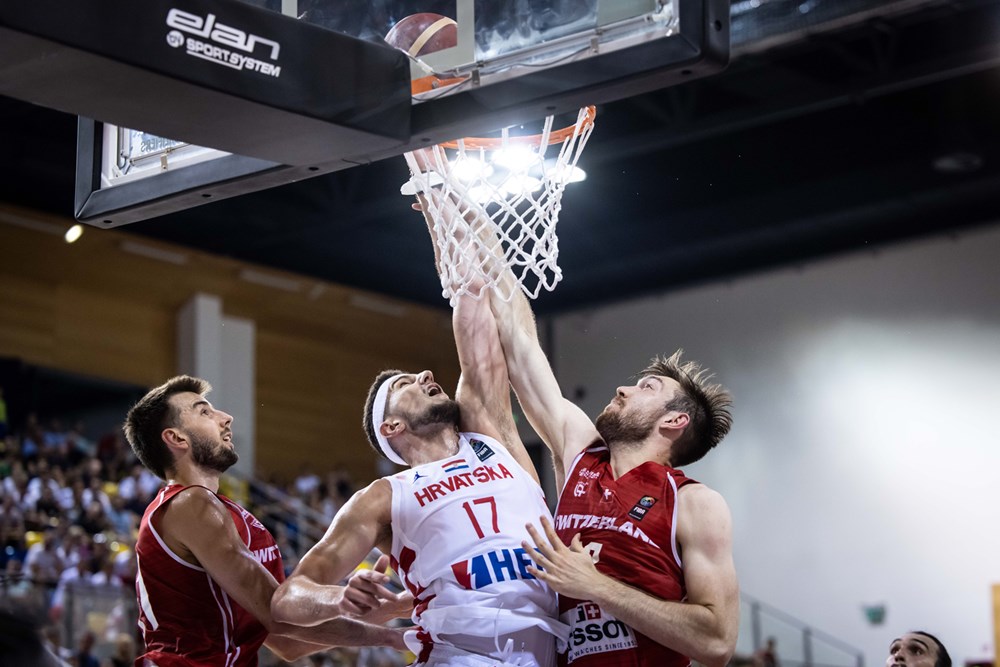
By then, Matković had already shown a great performance with 17 points and 8 rebounds. Bogdanović scored 10 points, and Dario Šarić scored 9 with 6 rebounds and two assists. Krunoslav Simon, although without a point, collected four assists and two steals by halftime.
The second half was an ideal opportunity for coach Mulaomerović to deploy his forces before going to EuroBasket, which starts on September 1, and give an opportunity to players who participated less in the previous part of the preparations and pre-qualifications for Eurobasket 2025. This did not affect the result. Matković was replaced under the basket by Ivica Zubac and with his dunk, Croatia went ahead for the first time by more than 30 points (59-28). The Croatian side entered the final quarter with +29 (70-41) and the game ended peacefully.
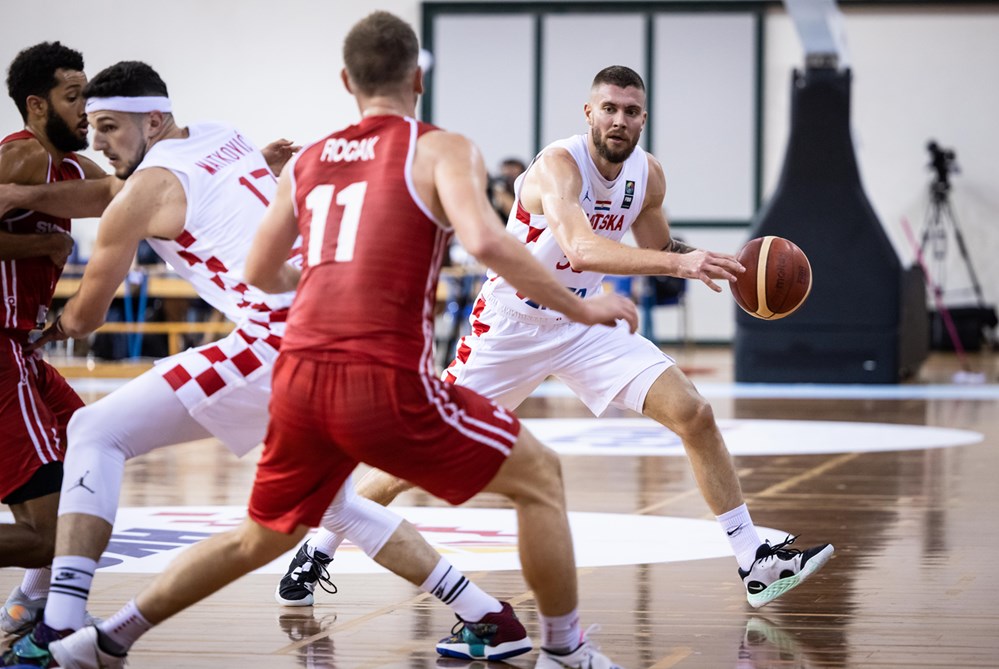
Karlo Matković finished the match with 17 points, 12 rebounds and 5 blocks, Dario Šarić scored 13 (7 rebounds), Ivica Zubac (7 rebounds) and Bojan Bogdanović 12 each, Toni Perković and Jaleen Smith 7 each, and Roko Prkačin 6 points.
The first game at EuroBasket in Milan will be played on Friday, September 2nd, 2022 at 17:00 against Greece.
Result by Quarters: 22-10, 28-16, 20-15, 14-12
Find the Boxscore here
40-60,000 Croatians Expected to Move to Switzerland Over Next Two Years
ZAGREB, 4 Jan 2022 - Switzerland opened its labor market to Croatian workers on 1 January, which will further encourage the emigration of young people from Croatia.
Citing an estimate by demographer Stjepan Šterc, the newspaper said that between 40,000 and 60,000 Croatians might emigrate to Switzerland over the next two years, reports Večernji List.
According to data from the Swiss statistical office for November 2020, 28,966 Croatian nationals live in that country, while Croatian Catholic missions, the Croatian Embassy, and the Croatian expatriate community put their number at around 80,000.
Many of the Croatians who emigrated to Switzerland in the 1970s to 1990s have in the meantime acquired Swiss citizenship.
"Switzerland is becoming an ideal emigration destination because it is a highly ordered society where a lot of our people already live. My estimate is that thanks to easier immigration rules, between 40,000 and 60,000 Croatian citizens will emigrate to that country in the next two years," Šterc said.
"Two years ago I held lectures in Switzerland and saw for myself how satisfied our people are with their life in that country. They are dreaming about Croatia being as orderly as Switzerland," he added.
Šterc noted that Croatians find it easy to adapt to new environments, which makes them ideal immigrants while retaining their Croatian identity. "Switzerland is not far and they can easily visit their families in Croatia. Today, young and educated people quickly adapt and learn the language of the host country," he said, describing Switzerland as a promised land for Croatians.
To read more about lifestyle in Croatia, follow TCN's dedicated page.
International Ethnology and Folklore Society Conference: Croatian Scientists on Homelessness in Croatia
July 1, 2021 - Research of Croatian Scientists on homelessness in Croatia was presented in June at the 15th edition of the International Society for Ethnology and Folklore (SIEF) conference.
Cooperation and comparative scientific studies between the Swiss and Croatians were already evident this year at the European Conference For Social Work Research (ECSWR).
As Total Croatia News previously reported, Dr. Lynette Šikić Mićanović participated in ECSWR representing Croatian scientific authors Suzana Sakić and Paula Greiner, with whom as a team, participated in a joint research project called "Exploring Homelessness and Pathways to Social Inclusion: A Comparative Study of Contexts and Challenges in Swiss and Croatian Cities (No. IZHRZO_180631/1), co-lead by the Swiss science team.
Back in June, as Ivo Pilar Social Research Institute informed, both Mićanović and Greiner participated in the 15th edition of the International Society for Ethnology and Folklore (SIEF) conference titled “Breaking the rules? Power, Participation, and Transgression". The conference was held online at the University of Helsinki, Finland, from June 19- 26. Both Šikić Mićanović and Greiner attended a panel called 'Res08a: Breaking Spatial Rules - Micro-practices of resistance and refusal against dominant forms of territoriality I', to present their work „Homelessness and social exclusion: the negotiation of public spaces“.
„Their paper explores how homeless people who live in or use public urban spaces (in the absence of their own private spaces) break its rules and convert it into their (private) spheres for different activities related to work, leisure, and/or personal needs such as sleep/rest and hygiene“, explained the Ivo Pilar Social Research Institute.
Just like for the ECSWR, the Institute added that their work presented on SIEF is part of a project “Exploring Homelessness and Pathways to Social Inclusion: A Comparative Study of Contexts and Challenges in Swiss and Croatian Cities” (No. IZHRZO_180631/1). Once again, it was financed within the Croatian-Swiss Research Program of the Croatian Science Foundation and the Swiss National Science Foundation with funds obtained from the Swiss-Croatian Cooperation Program.
As SIEF explains on its official website, SIEF is a „pluridisciplinary organization centered in the twin fields of ethnology and folklore (E&F) in their various denominations, within the larger family of anthropological and cultural-historical disciplines.“
„SIEF is eclectic and open-minded, promiscuous in its disciplinary relations while keeping faith with its founding values and vision. Global in its origins, today SIEF operates within an institutional context that is concentrated in but not limited to Europe," explains their website.
They add how their principal mission is to gather scholars to provide platforms for critical debate, networking, and exchange, as well as for building infrastructures for intellectual cooperation, publishing and promoting scientific work related to ethnology, folklore, and neighboring disciplines.
Learn more about Croatia: location, facts, economy, and more on our TC page.
For more about science in Croatia, follow TCN's dedicated page.
Ionic Liquids With Solid State Nanopores: New Valuable Progress From Ruđer Bošković Institute (IRB)
May 28, 2021 - A recently published study on ionic liquids with solid state nanopores at the Ruđer Bošković Institute (IRB) can help the energy storage sector.
The top scientific and research institution in Croatia, the Ruđer Bošković Institute (IRB), continues to be the home of interesting scientific progress.
Researchers from the IRB's computer bioscience team, Nataša Vučemilović-Alagić, and dr. Mario Špadina under the mentorship of dr. Ana Sunčana Smith cleared the phenomenon of transport inside liquids on the principle of nanopores in the solid-state. A nanopore is a small cavity in solid matter, invisible to the naked eye. This IRB research was done in collaboration with dr. Sanjin Marion and dr. Aleksandra Rađenović from École Polytechnique fédérale de Lausanne (EPFL) in Switzerland and the research results are published in the prestigious scientific journal Small which specializes in nanotechnology.
Professor Ana Sunčana Smith's IRB team deals with molecular descriptions of chemical and physical interactions of ionic liquids (liquids that are not neutral but have either positive or negative electric charge) on various solid surfaces. The goal was to determine the impact of specific ions and specific surfaces. The appliance of this knowledge is in line with guidelines of the EU Green Deal, and the UN sustainable development goals", explained IRB in the official press release.
The press release added this knowledge is useful in storing energy, as ionic liquids in nanopores represent an alternative to batteries.
„In this research, starting from the principle of water solutions, we combine ionic fluids and nanopores of different geometric features and materials to secure new nanofluid functionalities. This solves some of the relevant issues in the understanding of basic principles of transports in space-limited ionic liquids and ensuring better control of the speed of translocating within an analyte“, explained Dr. Ana Sunčana Smith.
It's worth noting that dr. Sunčana Smith is one of the Croatian scientists that received support from the Croatian European Research Council (ERC) for a very prestigious project in researching biological membranes worth 1,5 million euros.
Energy efficiency is something IRB shows to be really dedicated to, as evident by the progress IRB researchers made in exploring materials for converting CO2 to methanol alcohol, and IRB's Rovinj Sea Research Centre that celebrated 130 years of existence this year priorities maritime ecology and its protection in its research.
Learn more about Croatian inventions & discoveries: from Tesla to Rimac on our TC page.
For more about science in Croatia, follow TCN's dedicated page.
European Conference for Social Work Research: Croatian And Swiss Scientists Participate in Social Work Symposium
May 19, 2021 - Held in Bucharest, Romania, the European Conference For Social Work Research saw Croatian and Swiss scientists jointly participate in scientific issues of social work in Croatia and Switzerland.
Earlier in May, the University of Bucharest, located after the biggest city and capital of Romania, held an online edition of the European Conference For Social Work Research (ECSWR).
Swiss and Croatian teams jointly participated in the symposium „Opportunities and Obstacles in the Evaluation of Homelessness from a Lifeworld-oriented International Social Work Perspective“, which saw prof. Matthias Drilling and dr. Zsolt Temesvary represent their University of Applied Sciences and Arts Northwestern Switzerland (FHNW), and dr. Lynette Šikić Mićanović represent the Croatian Ivo Pilar Social Research Institute. The conference was organized by The European Social Work Research Association (ESWRA)
As stated by ESWRA's official website, the association was founded in 2014 with a goal to create social work research development, collaboration, and exchange across Europe. As the ECSWR conference saw overwhelming levels of engagement, the ESWRA association today counts 600 members from across more than 33 countries.
„ESWRA’s vision is to take forward the development, practice, and utilization of social work research to enhance knowledge about individual and social problems, and to promote just and equitable societies“, says ESWRA.
While Dr. Lynette Šikić Mićanović presented Croatia at the conference, she is also a member of the team that includes Suzana Sakić and Paula Greiner. Along with the aforementioned Swiss team, the Ivo Pilar Social Research Institute informed that the Croatian team participated in a joint research project called "Exploring Homelessness and Pathways to Social Inclusion: A Comparative Study of Contexts and Challenges in Swiss and Croatian Cities (No. IZHRZO_180631/1).
„This work is financed within the Croatian-Swiss Research Program of the Croatian Science Foundation and the Swiss National Science Foundation with funds obtained from the Swiss-Croatian Cooperation Program”, says the Ivo Pilar Social Research Institute on its website.
Looking at the „Homelessness and Social Exclusion in Croatia“ science paper whose author is Lynette Šikić-Mićanović from 2010, its abstract suggests that „homelessness is a relatively new phenomenon in most Croatian cities and has been largely ignored by policymakers and social scientists“. So, Šikić-Mičanović's paper aimed to research and contribute new data on a previously unresearched social group to answer the urgent need for a fuller understanding of the perceptions and experiences of homeless people in Croatia.
„Based on the research findings of this study, a number of recommendations can be made for the provision of comprehensive information, services, and assistance to lessen social exclusion among homeless persons as well as to facilitate their routes out of homelessness“, says the paper. Based on scientific research, there are overall five recommendations, as follows:
1.) Special attention – apart from accommodation – needs to be paid to the quality (or lack) of services that homeless people urgently require, such as medical, counseling, legal, supportive holistic assistance from professional qualified and sensitised staff, and so on.
2.) Continual and systematic evaluation is required at shelters and among the wider homeless population by teams of qualified persons, researchers, and/or non-governmental organisations for the assessment and articulation of their needs, abilities, aspirations, and problems.
3.) Programmes need to be developed at the local level to meet different contextual needs. These could include more accessible (less public) soup kitchens, perhaps with special menus (e.g., for diabetics); the introduction of public bathhouses, day centres, doctor’s/dentist’s surgery, or subsidised accommodation for homeless persons, depending on the context.
4.) Volunteers from all age groups should be found and trained with a view to increasing public awareness of homelessness and social exclusion and dispelling the myths and stereotypes about homeless people.
5.) Former shelter users should be monitored and assisted with accommodation and other support services (e.g., utility bills, furniture, therapy, financial aid, help with education) to prevent them from becoming homeless again.
These recommendations are directly quoted from the scientific paper for the sake of accuracy, and hopefully, for a better tomorrow, the policies of the state will follow the scientific findings and discoveries in social sciences.
Learn more about Croatia: location, facts, economy, and more on our TC page.
For more about science in Croatia, follow TCN's dedicated page.
U-21 Euros: Croatia Tops Switzerland For First Win in Koper (3:2)
March 28, 2021 - In the second round of the U-21 Euros, Croatia tops Switzerland 3:2 in Koper, Slovenia.
The Croatia U-21 side played the second round of the European Championship in Koper against Switzerland on Sunday.
Recall, Croatia lost to Portugal 1-0 in the first round, while Switzerland beat England with the same result. Igor Bišćan's team needed a good result today to stay in the game for the final phase of the competition. In the event of Croatia's defeat and Portugal's victory or draw against England, Croatia will no longer have a chance to pass.
Igor Bišćan made four changes compared to the last game, and instead of Šemper, Vušković, Majer, and Kulenović, he started Kotarski, Babec, Špikić, and Vizinger.
Lineups
Croatia: Kotarski - Šverko, Erlić, Franjić, Bradarić - Babec, Moro, Bistrović - Špikić, Vizinger, Ivanušec
Switzerland: Racioppi - Lotomba, van der Werff, Zesiger, Sidler - Pušić, Sohm, Domgjoni, Toma - Guillemenot, Zeqiri
Recap
The match started with a great opportunity for Switzerland. Zeqiri crossed to Guillemenot whose shot went just past the goal.
But it was Croatia to get ahead first.
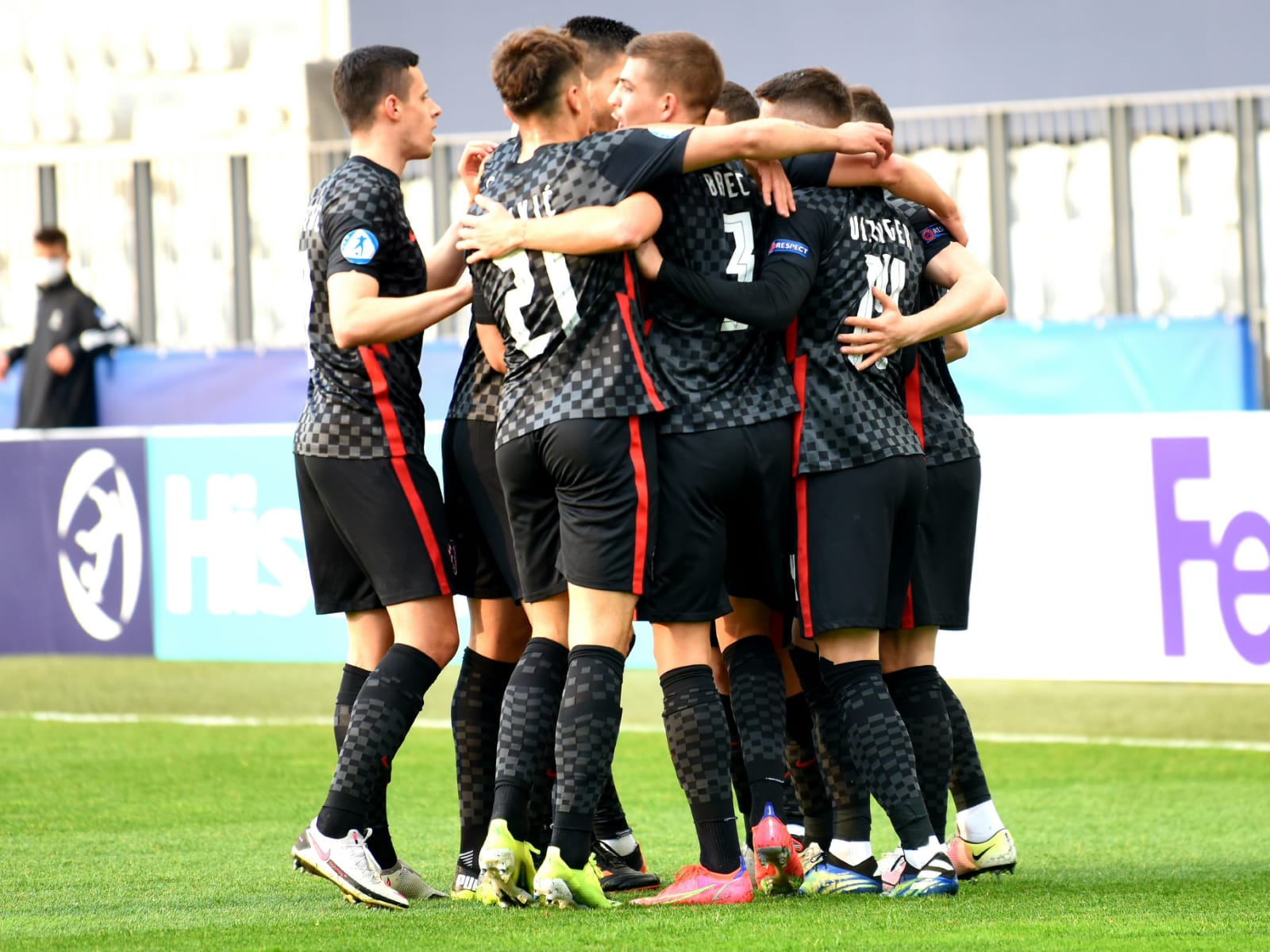
Slobodan Kadic
Switzerland goalkeeper Racioppi made a weak clearance, Ivanušec capitalized and shot a volley from about 20 meters. Racioppi could not get to the goal line quick enough, and Croatia led 1:0.
Switzerland was dangerous in Croatia's penalty area, only slightly missing the goal on a few occasions. In the 24th minute, Erlić was unable to continue the match and Bišćan made his first substitution. Vušković entered the pitch.
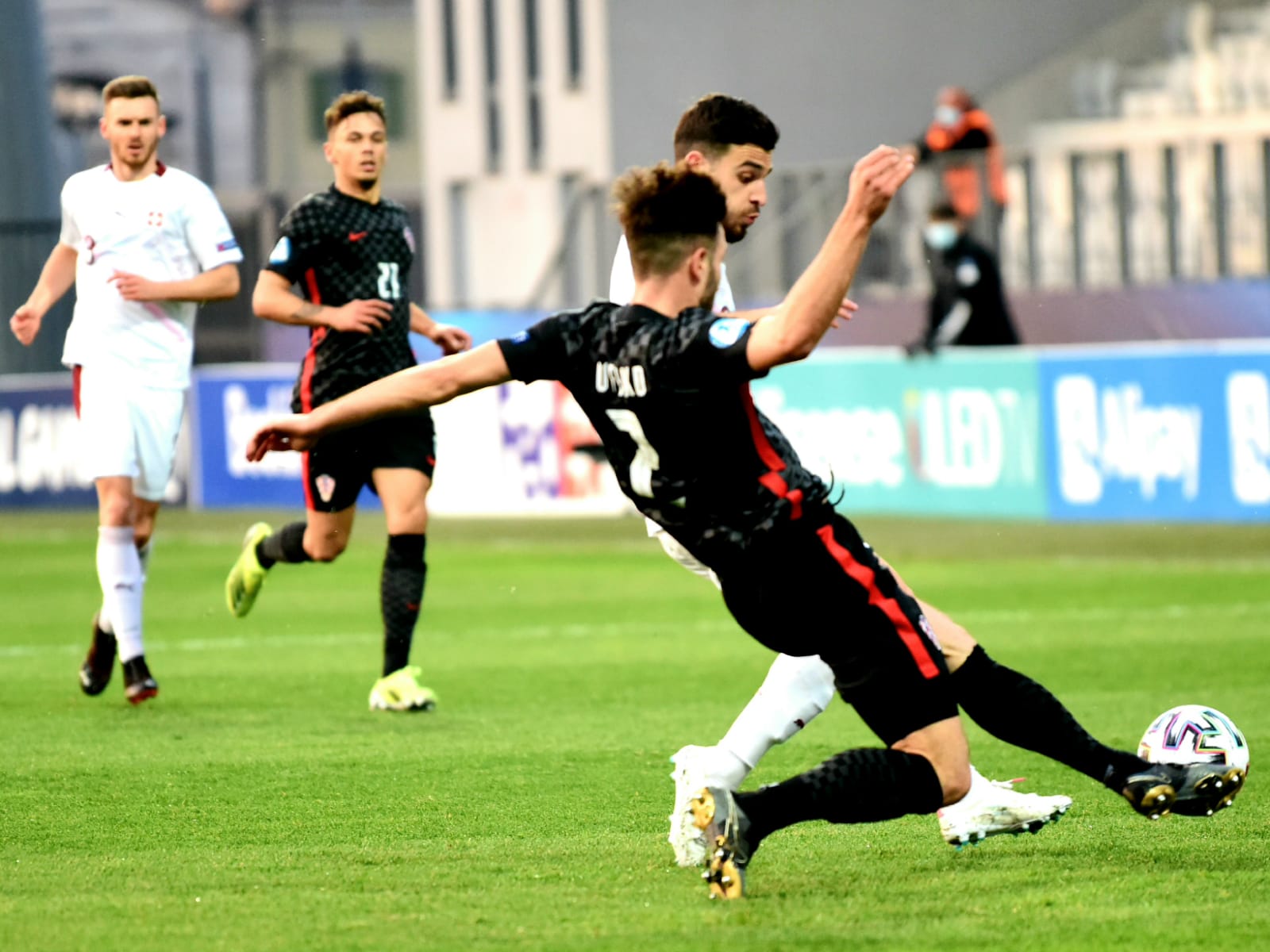
Slobodan Kadic
Guillemenot and Sidler both had chances to equalize for Switzerland, but Kotarski remained solid in goal. Switzerland continued attacking in the final minutes before halftime, but Croatia's defense allowed nothing through.
The ref added two minutes of injury time, and Croatia led 1:0 at the half.
The second half started without any changes on either side.
Moro and Ivanušec had an excellent opportunity to increase Croatia's lead in the 52nd minute, but the Switzerland keeper made two brilliant saves to keep them in the game.
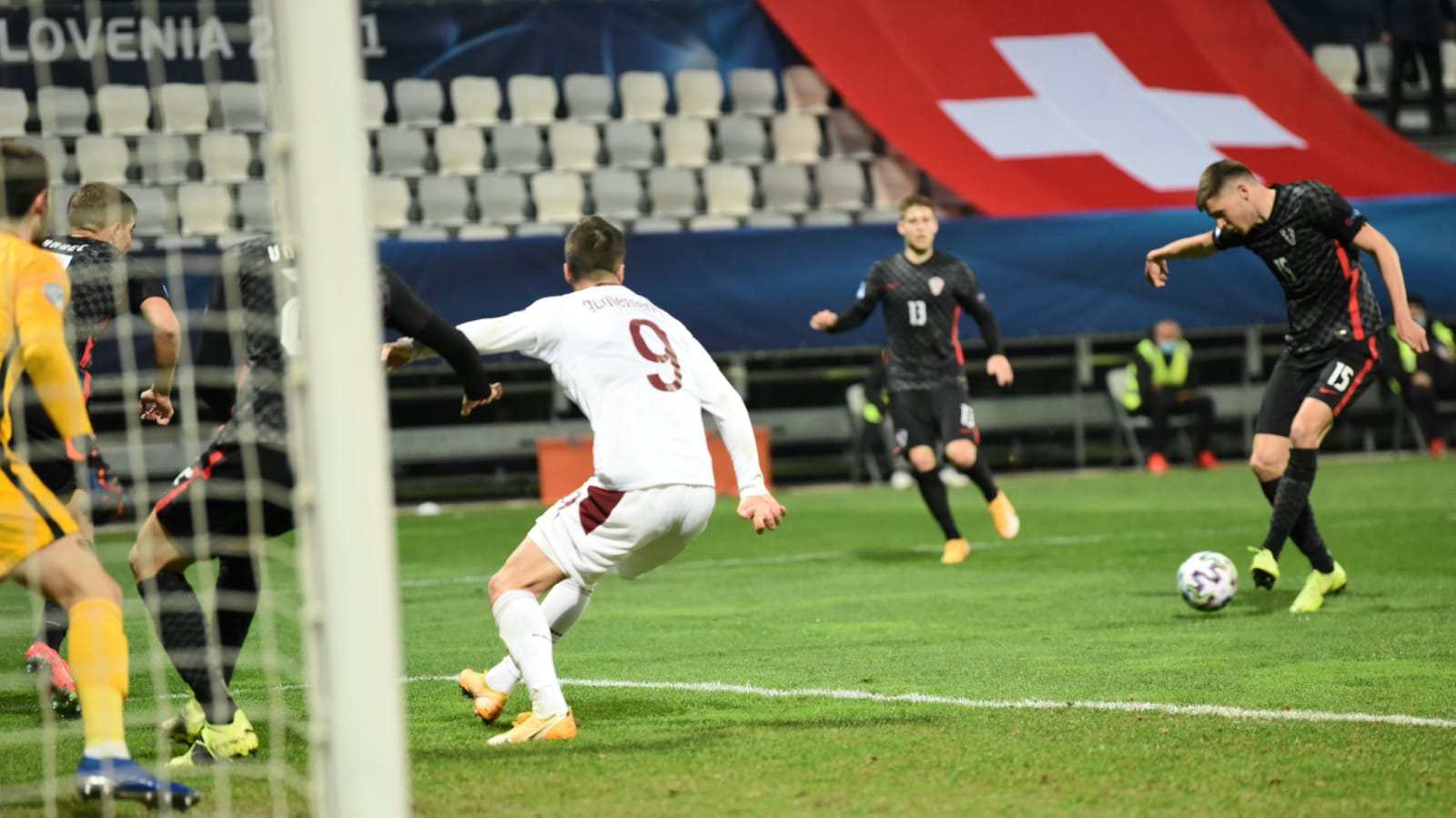
Slobodan Kadic
Moro, Špikić, and Bistrović combined for another chance which resulted in a corner.
Croatia was awarded a penalty in the 60th minute, which Nikola Moro scored for 2:0! Not even two minutes later, Vizinger made it 3:0!
Bišćan made changes for the first time in the second half in the 76th minute. Franjić, Moro, and Špikić came out for Krizmanić, Žaper, and Čolina. Moro also suffered an injury, hopefully nothing major.
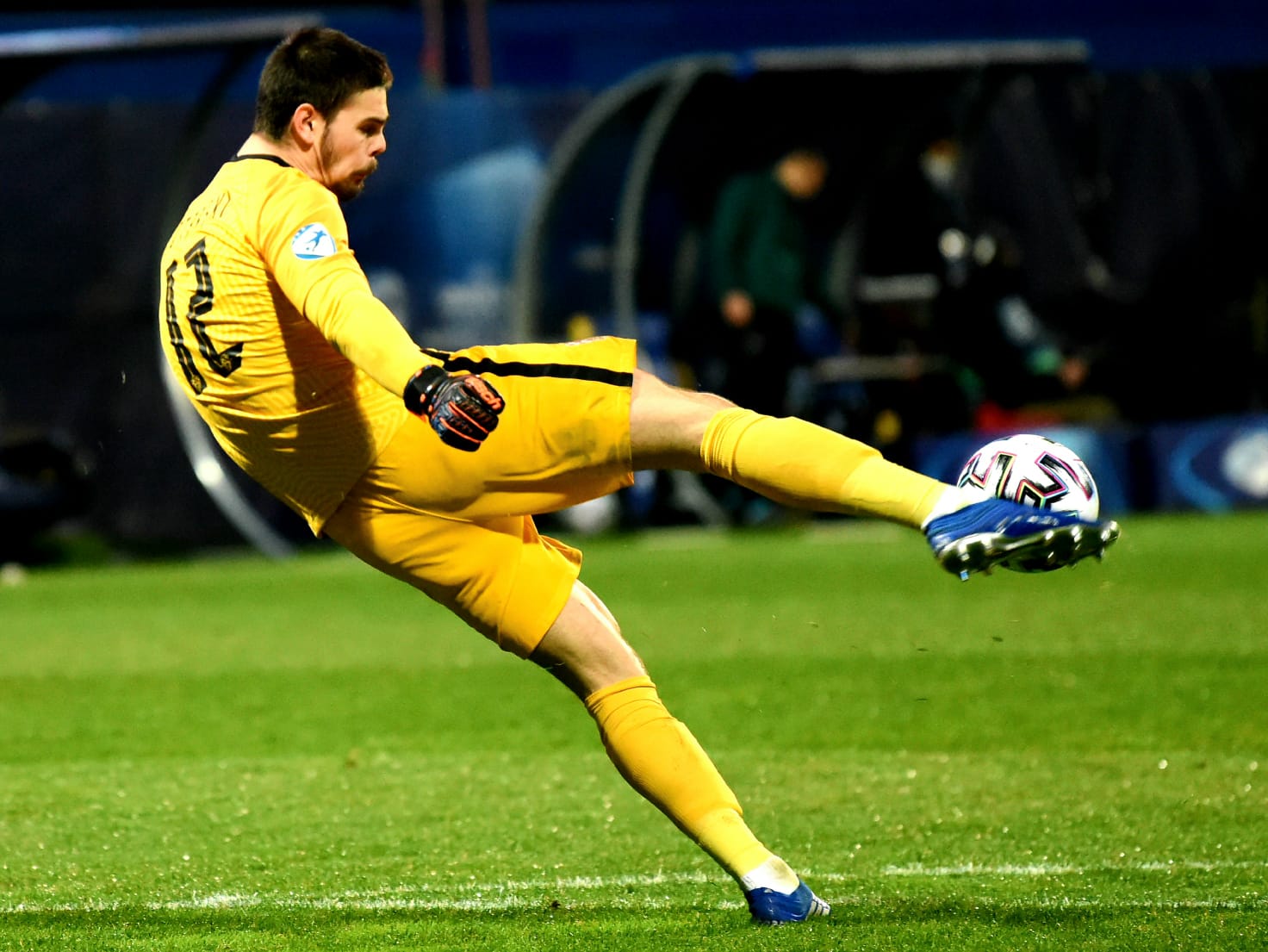
Slobodan Kadic
Switzerland was awarded a penalty in the 78th minute thanks to a Vizinger handball. Imeri scored for 3:1.
Switzerland reduced the result to 3:2 in the 89th minute. Kulenović knocked the ball into Croatia's net.
The match ended 3:2 for Croatia!
To read more about sport in Croatia, follow TCN's dedicated page.
Dalmatian Wine Presented in Switzerland as Part of Croatian EU Presidency
As Morski writes on the 24th of February, 2020, the presentation of Dalmatian wine in Switzerland from the 25th to the 26th of February, 2020 will see the participation of the Hvar Winemakers Association and the Wine Association of Dalmatia with the co-financing of the Tourist Board of the Municipality of Jelsa and the Municipality of Jelsa.
The presentations of Dalmatian wine in Switzerland are organised on the occasion of the Croatian Presidency of the EU Council in cooperation with the Permanent Mission of the Republic of Croatia to the United Nations Office in Geneva and the Croatian Embassy in Bern. In addition to the presentations of Dalmatian wine, the typical dishes of the island of Hvar will also be prepared and presented by chefs Kristo Barbic and Pavo Kordic, as will products from Hvar such as olive oil, lavender, etc.
Dalmatia is a true treasure trove when it comes to the sheer biodiversity of the wine world. Travelling from north to south, it's easy to find new, different varieties. The most famous and economically most important variety of Dalmatian wine is the internationally adored Plavac mali.
''With these presentations, we want to showcase the richness of varieties that Croatia has: we've gathered together twelve Dalmatian wineries, and as many as ten Dalmatian varieties will be tasted. We designed the tour in cooperation with the Tourist Board of the Municipality of Jelsa to present the environment in which our wines are made, because the story of Dalmatian wine is not only the taste and the aroma of wine, but also a number of cultural and anthropological elements together.
As an example, we will show what the island of Hvar has to offer, through its UNESCO heritage, products from the island, such as lavender, olive oil, typical cakes and even chocolates that capture the flavours of Dalmatia and the Mediterranean. And of course, with the sounds of the klapa music, because it is all part of Dalmatian life,'' explained Ivana Krstulović Caric, dipl.ing.agr, president of the association Hvar Winemakers.
Diplomatic guests, distributors, tour operators, and wine lovers will all participate in the events taking place at prestigious locations. We expect that the Dalmatian wine presentations will stimulate interest in Croatia, especially the island, which has an excellent eno-gastro offer, as well as a rich history and natural beauty. In recent years, the interest of tourists has increasingly turned to cycling, the study of cultural sites and heritage. In particular, we can emphasise the UNESCO-protected heritage, and the tourist season has been extended significantly in recent years because we're no longer focused solely on the sea and the sun,'' said Marija Marjan, Director of the Tourist Board of Jelsa Municipality.
Make sure to follow our dedicated Made in Croatia page for much more.
Switzerland, Croatia to Promote Cooperation Even More
ZAGREB, November 29, 2019 - Switzerland is very much interested in further advancing its relations with Croatia, notably in the economic sector, and great cooperation possibilities are opening up in the area of new technologies and tourism, Swiss President Ueli Maurer said in Zagreb on Friday.
There are 30,000 Croats in Switzerland, many Croats have dual citizenship and we can say that Croatia has become a nice face in our everyday life, as embodied by your president, Maurer told reporters after meeting with Croatian President Kolinda Grabar-Kitarović.
Maurer is on an official reciprocal visit to Croatia, six months after Grabar-Kitarović visited Switzerland.
The fact that we have met twice in less than six months proves that relations between Croatia and Switzerland are really excellent, both at the official and at the personal level, said Maurer.
Maurer expressed support for Croatia's accession to the Schengen area, assessing that Croatia is meeting its obligations very well.
He said that his country would strongly greet Croatia's accession to the area of passport-free travel as Croatia had an important strategic position in Europe.
Maurer also expressed satisfaction with cooperation with Croatia in international bodies where the two countries support one another without any reservations.
As regards bilateral relations, Switzerland is very much interested in further advancing the existing good relations, notably in the field of economy. Croatia is a very interesting country for investors from Switzerland, he said, stressing that there were great possibilities in the area of new technologies, such as the blockchain technology.
He noted that there were over 1,000 startups in Switzerland.
Croatia is a stable country that has a highly trained workforce, it belongs to the same cultural circle as Switzerland and in that sense it could serve as a springboard for exports by Swiss companies that would start operating in Croatia and export their products to other countries, Maurer said, stressing that his country was also interested in cooperation in tourism.
You are a friendly nation, you have a beautiful country and we will give you technical support and agree on further points in tourist trade and cooperation, he said.
Speaking of Croatia's EU presidency in the first half of 2020, he said that Switzerland, a non-EU member, wanted to strengthen its cooperation with the EU and expected Croatia's support in that regard.
President Grabar-Kitarović said that Switzerland ranked 12th in terms of investment in Croatia.
Bilateral trade in 2018 was 352 million euro, and Croatian exports to Switzerland have increased this year as well. In the first eight months, they increased by more than 15% to close to 140 million euro, while imports from Switzerland totalled 103 million euro, she said.
Swiss investors have so far invested in the pharmaceutical, mechanical and electronic industries, as well as in the insurance sector, and cooperation in the food industry has been growing as well, it was said.
The two countries also cooperate well in the field of research and technology.
Grabar-Kitarović informed her Swiss counterpart about the priorities of Croatia's EU presidency. "We will advocate a balanced and sustainable economic growth, dealing with burning demographic challenges, strengthening competitiveness and connectivity in the EU and strengthening the security of European citizens, both internal and external," she said.
"We will work on a comprehensive approach to migrations as well as on new EU guidelines in the area of freedom, security and justice and continue to support the EU's active role in the neighbourhood, notably Southeast Europe."
"We will pay special attention to processes that concern better functioning of the Schengen area, which we will join in the near future and which we consider to be of crucial importance for the EU and countries of the European Economic Area," she concluded.
More news about relations between Croatia and Switzerland can be found in the Politics section.
Grabar-Kitarović Visits Croats at ETH Zurich Technological University
ZAGREB, July 9, 2019 - On the second day of her visit to Switzerland, Croatian President Kolinda Grabar-Kitarović on Tuesday visited the ETH Zurich Technological University and laid wreaths at a plaque dedicated to two Croatian Nobel Prize winners, Vladimir Prelog and Lavoslav Ružička, and then met with Croatian students and researchers at that institution.
ETH Vice President for Research and Corporate Relations Prof. Detlef Guenther accompanied Grabar-Kitarović during the wreath laying ceremony.
Ružička won the Nobel Prize in Chemistry in 1939 and today ETH has an award named after Ružička. Prelog was the Nobel Prize laureate in Chemistry in 1975.
ETH is an institution that boasts 21 Nobel Prize winners and currently there are about seventy students studying there.
The president then met with Croatian students at the university. Two Croatian professors and researchers, Nenad Ban and Srđan Čapkun, gave lectures and spoke about their work and education.
Čapkun presented a paper on security systems, while Ban spoke about his research into ribosomes and how he came to Zurich and, he said, one of the best universities in the world, adding that Zurich was similar to Zagreb as a central European city.
The president underscored that Croatia has huge scientific potential which needs to be worked on from the earliest age. She said that it is necessary to fight against nepotism and corruption in Croatian science and to promote the reform in the education system.
She called on Croatian students to return to the homeland because they are "particularly needed."
Later the president will hold a lecture at the Europa Institute of the University of Zurich on the topic "Europe - challenges in an increasingly complex world". She will conclude her visit by meeting with representatives of the Swiss business sector and the Chamber of Commerce Switzerland - Central Europe.
More news about relations between Croatia and Switzerland can be found in the Politics section.
President Meets with Croatian Diaspora in Switzerland
ZAGREB, July 9, 2019 - President Kolinda Grabar-Kitarović met with Croatian expatriates in Switzerland on Monday, saying Croats had convinced foreigners of how beautiful their country was but that not the world should be convinced, first and foremost expatriates, of how good Croatia was to live in.
"You have always been there for us, also when it was the hardest for Croatia, and I thank you for that," she told them at the residence of the Croatian ambassador to Switzerland in Muri bei Bern.
The meeting with Croatian expatriates was organised on the occasion of Croatia's Statehood Day. Earlier in the day, the president met with the heads of the Croatian Catholic Mission in Switzerland.
"Croatian emigrants, especially in the Homeland War, provided not just material aid but also moral and political support, which was necessary so that foreign countries would recognise us as a state with the right to exist," the president said.
"We have convinced foreigners of how beautiful Croatia is. Now we have to convince the world, first and foremost our emigrants, of how good Croatia is to live in. My branding project, as well as the demography project, is aimed at making Croatia a country befitting man," she added.
One of the demography measures is to strengthen ties with expatriates and facilitate their contact with the homeland, "with their return being the goal," the president said.
She reiterated that "Croatia can stand side by side with the most developed countries and there is no reason why it shouldn't be so."
"We have all the resources. We are much richer in terms of resources than many countries, including Switzerland... We just need organisation, a work ethic, mutual respect, faith in the state, family, community, in God and all the values which make a society noble," the president said.
More diaspora news can be found in the dedicated section.


